Guest post by MANISHA SETHI: It has been seven months since the Jamia Teachers’ Solidarity Association brought out its report, Framed, Damned, Acquitted, chronicling in detail how the Delhi Police’s Special Cell implicated innocents – former militants, police informers, businessmen, and just ordinary, unlucky men – as terrorists. It is one of the few documents that lends evidentiary credence to the widespread sense amongst Muslims that they are being targeted in the war against terror. Apologists for the police and investigative agencies however do not tire of contesting its conclusions, namely that there is a systemic and systematic bias against minorities when it comes to terror investigations. What bias, they ask. As does our chief National Security ‘analyst’ Praveen Swami, who has stressed that “liberals are compromising the war against jihadi terror“.
Could such ‘analysts’ be echoing the sentiments of a judge of the Allahabad High court, who less than two decades after India gained independence, noted, that “in the entire country there is not another criminal force whose misdeeds can come anywhere near the list of crimes of that organised body called the Indian Police force” (All India Reporter, 1964, Vol. 51, 702). Do they mean, that our extraordinarily brutal police force is even-handed in its application of cruelty across the spectrum of our citizenry, and is not especially biased against the Muslims, or Dalits, adivasis and so on?
One doubts if this is what these commentators mean. Confronted by a long list of acquittals in terror trials, they argue that this is a result simply of incompetence or stretched resources. Nothing in the way these investigations are carried out or prosecuted seems to them to suggest prejudice against Muslims. Comparable data of falling conviction rates in murder, but especially rape, is cited as proof that it is poor investigative skills and other mundane matters rather than any ‘bias’ that seems to be at the root of the acquittals of terror suspects.
And further, this unnecessary fuss over communal profiling or targeting is ‘compromising the war against jihadi terror’. If only we were to zip up our lips and turn a blind eye to what seems to us as deliberate framing of members of a specific community—we would greatly strengthen the battle against Jihadi terror.
Just days before we released our report last year, there were a series of arrests in Bangalore and Hubli, where young men, many of whom were university educated and professionals, were arrested by the Bangalore Central Crime Branch (CCB) for conspiring to kill right-wing Hindu leaders. The news channels and papers, vernacular and English alike, delighted in headlines – one more perverse than the other – which confidently spoke about the guilt of those arrested. Six months later, journalist Muthiur Rehman Siddiqui and technician Yusuf Nalband – two of those 15 arrested were discharged, while the third, Aijaz Mirza, a scientist with DRDO, was released on bail – even as his name did not appear in the chargesheet filed by the NIA, to whom the case had been transferred since then.
Upon their release, the three young men spoke movingly of their period of incarceration, the trauma they and their families suffered – but also of the sense of hurt they felt at having been arrested, they suspected, only because they were Muslims.
Plain short sightedness, felt our leading security expert:
“The facts … suggest the need for a more nuanced reading of these instances of Muslims who are released for want of evidence” and not simply as another case of “police-led persecution of Muslims.” [Praveen Swami]
Swami invites us to “test the assumptions against the facts in the Bangalore case.” Yes, let’s do that. (And, er, it is known popularly as the Bangalore Assassination case, not the ‘Bangalore Jihad’ case.) He writes:
“The NIA’s charge-sheet outlines perhaps the most ambitious jihadist project since 26/11, and the first Indian case involving online self-radicalisation.”
So ambitious was this project that the centrepiece of evidence is an obsolete berretta pistol, which would have been used allegedly to kill the Hindutva leaning journalists.
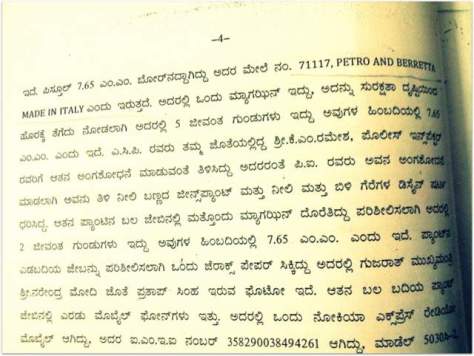
‘Online self radicalization’ is a nice sounding phrase, in vogue these days in security study circles. But as theories go, it is dangerous to base them on the shifting quick sand of leaks and dossiers alone. Six months ago, journalists who hadn’t anticipated the possibility of Muthiur Rehman’s discharge were referring to him as “the face of modern violent Islamic extremism”. What happened since to the spectre of new educated professional as jihadi terrorist?
In 2008, Swami had made a shot at developing a kind of authoritative account of Indian jihadi groups outside of J&K, which he labelled the ‘well-tempered Jihad’. The paper was based largely on his own reportage, in turn based on ‘highly placed sources’ and investigators (and a nice game it is too, trying to untangle the references and citations of this burgeoning ‘scholarship’ on ‘Jihadi terror’). The key to understanding this well-tempered jihad were the “three major strikes on mosques and Muslim civilians: at Malegaon in 2006, followed by the firebombing of a New Delhi-Lahore train and the Mecca Masjid in Hyderabad in 2007”… carried out by “Islamist terror groups”. “It is possible that the successive strikes on Muslim civilians… were intended to educate: that is, to persuade followers that the restrictions imposed on the jihad in Jammu and Kashmir posed an existential threat to Islam and Pakistan.” And, “Elaborately dressed as the Samjhauta Express attack to resemble an arson attack that could plausibly have been presented as the work of a Hindu fundamentalist mob, the bombing enabled Saeed to represent it as part of ‘a plot to massacre Muslims’.”
Hmmm.
So is the current ‘jihad’ well tempered or not – given that none of these three incidents, so crucial to its tempering, turned out to be not the product of the Jihadi groups? What of the elaborate plots, confidently narrated as the unfolding of the Jihadi story in India, many of its twists and turns now established as its definitive signposts? Was it bias that led Praveen Swami’s Intelligence Bureau handlers to lay the culpability of these three attacks at the doors of Jihadi groups, and Swami to build his high theories on these claims? Or sheer incompetence?
Anyhow, to return to the Bangalore case and sense of prejudice.
The author asks if it was “unreasonable” to hold the trio – Muthiur Rehman Siddiqui, Yusuf Nalband and Aijaz Mirza – on suspicion, considering that Mirza had access to sensitive information and Siddiqui visited various jihadist websites. (It is another matter that a journalist called Siddiqui visiting Jihadist website raises suspicion, but one named Swami doesn’t.) The NIA did, after all, release them when they found no prosecutable evidence against them.
They spent six months in jail, without a chargesheet being filed against them. Indeed, the Bangalore Central Crime Branch (CCB) knew by September, less than a month after the arrest, and five months before the release, that they didn’t have a case against Siddiqui. A wtiness statement, recorded by Assistant Commissioner of Police (ACP) K. N. Jithendranath of the CCB, on 20 September 2012 i.e., within 21 days of Siddiqui’s arrest, shows that a vigorous examination of his email IDs had clearly established the absence of any connection between Siddiqui and the alleged terror conspiracy. It clearly states that the personal email ID of Muthiur-Rehman Siddiqui contained “no incriminating materials/text/attachments”.
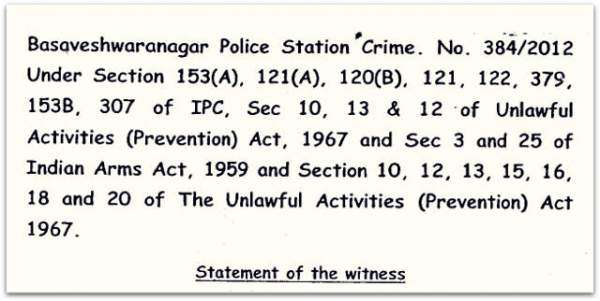
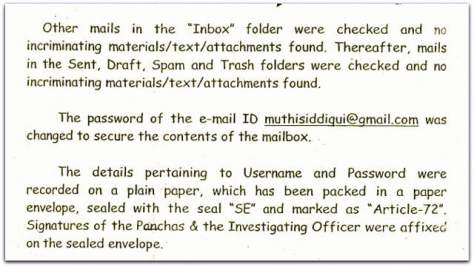
So, instead of showing gratitude to the police for having let them off without fabricating evidence or coercing confessions – as Praveen Swami demands of us – we should in fact be asking why they were kept in incarceration despite unambiguous proof of their innocence. Indeed, it needs to be remembered that the agencies took six months –180 days – to file the charge-sheet, 90 days more than the normal period for filing charges under ordinary law. At the conclusion of the 90-days- period, the CCB sought an extension, and received one instantly. Neither did it deem it fit to inform the court that they hadn’t a case against at least some of the arrested young men; nor did the court examine the merits or the progress of the investigation before granting a blanket extension for another 90 days for the charge-sheet to be filed while the arrested continued to be in custody. It was a terror investigation. A matter of national security. Who dares question investigating agencies? Which court risks granting bail?
This, brings us to the characteristic nature of terror investigations and trials. It allows for cynical audits such as the one undertaken by Swami to dominate the mainstream discourse: So what, if three innocents were kept in custody for six months without bail? So what if their reputations were ground to dust? So what if they were denied the right to meet with their families long after their arrest, having to make do with furtive semi-secret meetings in parks and marriage halls granted by the CCB? So what if they lost their jobs, their confidence, their peace of mind, condemned now to live forever with harrowing memories? So what if people, total strangers, accost them on streets, and ask them, ‘hey you, you are the one who was arrested by the police?’ — something that’s made them fearful of public places. It’s just a bit of collateral damage. Too bad. But nothing to grieve over or complain about, really. Because this, Swami writes, “has to be read against the possible harm to the community caused by the investigators’ failure to arrest – which in this case, might have been several deaths.”
It is not for nothing that a substantial portion of UAPA (Unlawful Activities Prevention Act) cases pertain not to actual events of violence, but to conspiracies. Conspiracies based on seizures of ‘Jihadi Urdu literature’, SIMI (Students Islamic Movement of India) magazines published before the ban on the organization, I.D. cards and membership forms of banned militant organisations, conveniently recovered from the pockets of ‘operatives’ of terror groups. Conspiracies which are described in minute detail in media commentary by security experts – much like Muthiur Rehman’s online searches on jihadist websites, which incidentally appears neither in the FIR, nor the chargesheet, but only in the fevered writings of these experts – which build and sustain the guilt of accused and arrested ‘terrorists’.
Yes, certainly, “police forces across the world are allowed, by law, to arrest suspects during investigation.” But there are norms and protocols laid down about the way in which these arrests may be made. The DK Basu Guidelines seem to be followed only in breach. How do incompetence or stretched resources justify the failure of the CCB to inform the parents of those arrested about their detention and arrests? Is it laziness which led the CCB to disallow parents to meet their arrested sons in custody?
And this is the most dangerous and perhaps the most enduring transformation yet wrought by the discourse of counter terrorism: the presumption of guilt and the slow erosion of due process and rule of law; the urgency of national security providing justification for lowering the burden of proof, extended detention and denial of bail.
For all our author may protest, one of the touchstones of the discourse on terrorism is that its image of a terrorist is not an empty one, but one marked by signifiers of community. Don’t go too far – just listen into what our top cops have to say:
“In cases of terror attacks or communal riots, if the police goes after the perpetrators of the violence, and they happen to be mostly Muslim, you cannot, in the name of secularism, expect the police to act in proportion to their population.” (Prakash Singh, former DG, BSF)
“There is nothing like Saffron terrorism. It just doesn’t exist in the Hindu pantheon.” (MN Singh, former Commissioner of Police, Mumbai)
Since Swami picks on Mecca Masjid investigation as the prime example of the liberal mis-assumption about police bias, let us spend a little time on it.
He says in that article about sinful liberals:
“The claim that the police targeted Muslims for the Mecca Masjid bombing has been repeated so often as to become received truth… The truth is that 22 Muslim men were indeed arrested, and found innocent during trial. However, anyone who has takes the trouble to read First Information Report 198 filed at the Gopalapuram Police Station in 2007 knows not one of the arrests had anything to do with the Mecca Masjid case.
Police officers driven by malice, or seeking to cover-up their incompetence, could have initiated false prosecutions linking these men to the Mecca Masjid attack. They did not – and went on to uncover the Hindutva terrorist network now blamed for the attack.”
Now the above is not simply a reproduction of Intelligence Bureau dossiers, as the author is usually wont to do; it is worse. It is a deliberate and pernicious attempt to sanitize the Hyderabad police, its torture and its desperate efforts to implicate innocents in a terror conspiracy. It is almost fantastical, this timeline: 22 youths arrested, found innocent, released. Three cheers for our investigative agencies. Down with naysayers.
The truth is that around 70 youth were rounded up and taken to undisclosed, sometimes private, locations. Most of them from the Muslim concentrated inner city area of Moosaram Bagh. Some were picked up right after the Mecca masjid blasts; others after the twin blasts three months later. They suffered varying periods of illegal detention and what Swami may like to call ‘enhanced interrogation techniques’ – torture to the rest of us. All of them were asked to confess to the Mecca Masjid and Lumbini Park blasts in the city – and some were subjected to narco tests to produce favourable results.
Here is an extract from the report of Advocate Ravi Chander Committee (.pdf) constituted by the Andhra Pradesh Minorities Commission after an outcry by the Muslim community of Hyderabad which felt besieged and hunted.
Mohd. Abdul Raheem, Auto Driver, age 26 years, picked up on 3rd September 2007.
1. Arrested without being informed of charge
2. On September 3, about 4 police came home around 8 pm, and took me in an auto till Amberpet, there after taken in a two wheeler with eyes blindfolded.
3. Taken to Bolaram Police station, enquired till about midnight and the next morning taken, beaten, toes tied, beaten on foot of sole and abused (sic).
4. Became unconscious and as soon as I gained consciousness, there were about 7-8 others who were also beaten up.
Signs of torture were visible even in November when the Commission made its last visit to the Cheriapally jail. (Link already given above)
Advocate Ravi Chander concluded: “It is clear that all victims belong to a single community and mostly to a single class. This may be insufficient to place the burden directly at a single doorstep, namely the police. They however surely tell a pattern. A seriously danger pattern.”
Raheem was one of those booked under FIR number 198 / 2007 of Gopalapuran PS. Absolutely, do take the trouble of reading the FIR, as Swami suggests. He is right that it does not breathe a word about Mecca Masjid blasts. But this is because the Hyderabad police wasn’t in charge of investigating the blasts by then. The case had already been transferred to the CBI. The Hyderabad Police was chaffed to discover that the narco-tests and the confessions extracted from Raheem and others, didn’t appeal to the CBI. So, what it did do? It created new cases of conspiracy: 198 and 75 of 2007.
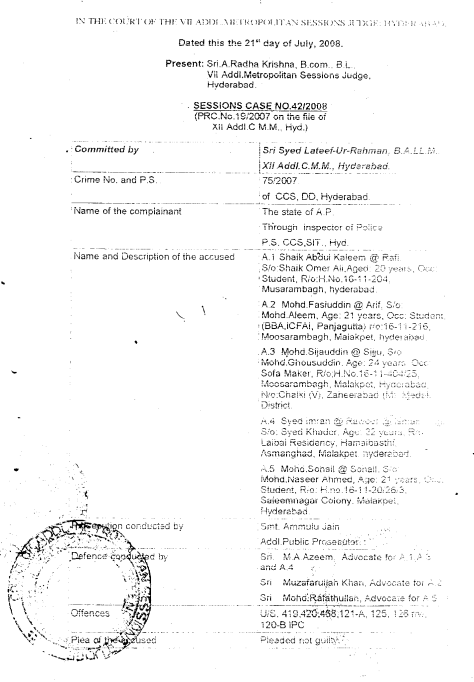
The Hyderabad police, in fact, did precisely what Swami applauds them for not doing.
Both the cases ended in acquittal as the police could not bring absolutely anything on record to link these men with Jihadi activities.
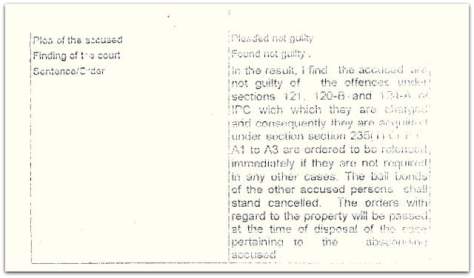
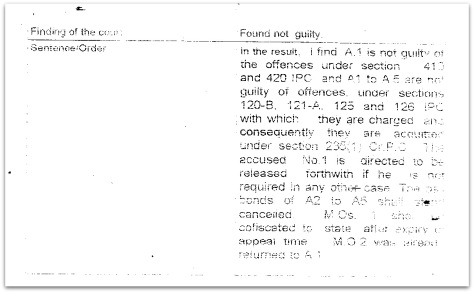
Exactly what stage of literary evolution does Swami’s ‘liberal’ play with facts and evidence belong to: “primitive fable” or “post-modern text”?
There is no denying the deep rot in the policing system, and that at least some of it has to do with it being understaffed, over worked, and being frugally paid. But this rot is also fundamentally about the impunity and power the police enjoys over ordinary citizens. The NCRB data for 2011 shows that 61,765 complaints were received against police personnel in that year, of which only 913 were eventually sent for trial. A mere 1.4 per cent! About 16 per cent of complaints were referred for ‘regular departmental action’ — and the remaining were either dismissed as false or did not make it past departmental, magisterial or judicial inquiries.
As for the comparison between rape and terrorism convictions, a sociological reading of the process of investigation and adjudication will tell us how different, indeed contrasting are the results in the two situations – terrorism and rape – though both are framed by dominant social norms and prejudices. ‘The woman was asking for it’ is so deeply embedded in our moral universe that it is often the accused, and not the complainant (or the ‘victim’), who is the subject of the system’s sympathy and protection. On the other hand is the case of the one accused of terrorism. Lawyers have been attacked in court premises for daring to take up cases of terror accused. They are tried under a law that doesn’t favour bail and considerably dilutes the parametres of evidence.
To think that the malaise that afflicts the policing system in India in general is all that ails terror investigations ignores that these investigations are conducted not by the local thana and the baton wielding constable but by elite, pampered forces such as the Mumbai ATS and the Delhi Police Special Cell with unaccounted cash supplies, secret service funds and inexhaustible resources.
Prejudice in terror investigations isn’t simply a bias that seeps in into the police force, unknown, unconsciously. Rather, it rests on the knowledge of prejudice in our society, polity and media, and uses it to its full advantage. Prakash Singh and M.N. Singh know that they can get away with their jaundiced assumptions. It is for this reason that journalists can get away by projecting Muthiur Rehman Siddiqui as the new face of terror with no fear of repercussion – and not just because libel laws are weak in India. It is for this reason that Swami can be blasé about his past blunders about his predictions and projections of Jihadi terror.
The thing with this bias is that it isn’t seen as a bias at all. It has been rendered as the commonsense.
(Manisha Sethi is an activist with Jamia Teachers’ Solidarity Association.)
Related posts from Kafila archives:

Manisha deserves thanks for exposing the dirty games which Indian law-enforcing (which in fact are law-breaking) agencies play with the lives and liberties of of minorities specially Muslims. This piece, in fact, turns out to be a well-researched document; a primer on the illegal activities of the Indian State’s police. Praveen Swami, a parrot of Indian intelligence establishment, needs to tell us that why the butchers of Sikhs in 1984 and Dalits in different parts of the country have not been brought to book and punished. Were they also part of ‘Jehadi’ network or Indian Mujahedin? Muslims are being targeted because both Congress & BJP cater to Hindutva politics which stands for cleansing of Muslims from India.
LikeLike
It was a very well researched piece and kudos to Manisha for it.
I feel our society needs both points of views, Manisha’s and Praveen’s, to remain a progressive society that is vigilant against threats posed by Islamic terror. Whether we like it or not, Islamic terror is a reality just like prejudice against Muslims is. It is futile to discuss which came first.
LikeLike
Manisha deserves a pat for exposing the fallacies of Parveeen Swamy and the communally biased behaviour of Indian Police..
LikeLike
This is a brilliant piece of investigation, deconstructing IB officer Praveen Swami, who is also said to be a journalist.
LikeLike
Very forcefully argued and well documented –
LikeLike
Being a regular reader of ‘The Hindu’ I have had the opportunity of following the exploits of Mr Praveen Swami, whose ‘anti-terror’ reports would qualify among the most dreadful pieces of disinformation and hate-propaganda in the history of Indian journalism. For years, whenever a blast or ‘incident’ occured I used to dread, and brace myself for, the noxious counterblast by Mr Swami in the newspaper the next day.
One just needs to go back to the newspaper files and follow his coverage of so many incidents in J&K, Samjhauta Express blasts, the blasts at Mecca Masjid, Ajmer Sharif, Nanded, Malegaon, and ‘encounters’, including his favourite Batla House ‘encounter’. He seemed to have a third eye. He didn’t ever ask the question “who did it?” He already knew. Among so many ‘insiders’ he was the ultimate insider: he knew of places and modules his ‘sources’ did not, and he often gave the cue. When so many of the cases turned out to be fabricated by the agencies, there was not a word of regret by our reporter. In Mr Swami’s book the ‘Islamic’ actors of his stories remain charged, tried and indicted for the crime they did not know of. Neither did his newspaper ever felt the need to clarify for any instance of so much unjust reporting and ‘expert analysis’ by its correspondent for all these years.
Such impunity and lack of self awareness puts Mr Swami quite a few notches above the ‘specialists’ and schemers of our police and security agencies. Left to themselves those operatives won’t go as far as our journalist does, and some may even betray a sense of guilt or shame at some stage in their life.
LikeLike
The only problem with this meticulous analysis is that it leaves no room for Swami to respond.
LikeLike
:-)
LikeLike
well written article with lot of homework. really thankful to manisha for exposing the dirty politics behind stigmatising and terorrising muslims for being muslims!!!
LikeLike
Thank you for responding to this predictable Right Wing apologist.
LikeLike
As always, Manisha Sethi’s pieces are meticulous and her fight against injustice to Indian citizens bearing a Muslim name is admirable. It is persons like Manisha Sethi who keep one’s faith in India still going; the Hindutva guys would have driven India the Taliban way long ago. Thank you Manisha.
LikeLike
Great analysis, but this kind of solidly researched article needs a much much wider audience although all kudos to kafila for publishing it. Manisha will never convince diehard swamiites who are unfortunately legion – but at least they would be forced to read her arguments! Anyway, thanks for this.
LikeLike
I guess it could get a bit difficult to figure out whether you are using the source or the source is using you. *ducks*
LikeLike
Very Well done Manisha,you have done a tremendous job,you deserve
thanks from all.
LikeLike
Years ago, when the Samjauhta Express Blast was still the handiwork of Muslim terrorists, I met this Oriya IPS fellow, who heads (or used to head) NIA. I showed him some tape transcripts and told him that Hindu terrorists had done the Samjauhta Express. He brought in two officers to see the transcripts and he then told me that his NIA is investigating this angle, but he still doesn’t believe Hindus can do it! “Do you think Hindus can plant bombs,” he asked me. I told him that transcripts do suggest so. He then shrugged off the tape transcripts, saying that these guys just blabber! They can’t kill a mosquito! With this mindset, NIA, however, finally (though reluctantly) found the Hindu terror angle to the entire episode. Most of Indian police officers are prejudiced!
Good work Manisha!
LikeLike
enough is enough! who is right and who wrong, it is so difficult to identify in today’s times, even for well informed critical people like me. all seem to have a personal or ideological interest in supporting one or the other side and bringing their perspective as the right one. i only know that pleading for one side without considering the facts that we are all human beings with our weaknesses and strengths, is wrong and does not bring us further. Muslims by far are no worse off than many other discriminated sections of Indian society. i am not prepared to pardon any side if they spread hate against others., be it the owassi brothers, the jamaat e islam hind, the Shiv Senaites, the radicalist Hindus or Christians etc. etc. and believe me, MOST indians are no radicals, but quite normal in so far as they do not support any extremists on any side. so let us accept manisha’s as well as Praveen’s researches as important pieces of work helping us keep watch on all .
LikeLike
All respect to the author and JTSA for taking on the “security” establishment” and their media shills. One that has puzzled me over the years – why would the left-leaning Frontline and The Hindu support and nurture Praveen Swami for at least 15-20 years? The compromises made by the left in matters of “national security” border on the criminal (accessory after the fact) and deserve to be examined and debated in public.
LikeLike
Many thanks to Manisha Sethi for this fine analysis of a poorly researched judge-jury-executioner report by Parveen Swami. It gives me hope that the ongoing battle against murderous bias has not yet been conceded. Thanks also to Nivedita Menon for posting it here. We need such exposes of embedded journalism to be further publicised. The tawdry pretensions of The Hindu as a progressive paper has also been bared.
LikeLike